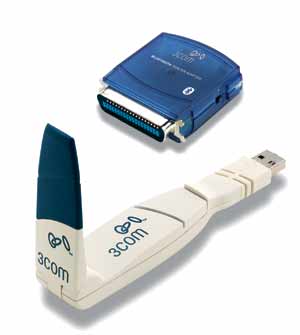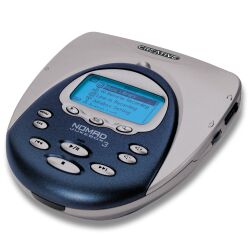Bluetooth gains momentum; Firewire transfers files up to 40 times faster than USB ports
by Alan Zisman (c) 2002 First published in Business in Vancouver , Issue #674 September 24-30 GearGuide column
They're
not standard on most PCs, at least not yet,
but new ways to connect add-ons are getting closer to mass acceptance
as they become increasingly useful.
Throw away the cables with Bluetooth
Bluetooth is a wireless connection technology that has seemed to be a year away for three years or so. Unlike the more common WiFi (802.11) standard, which is used to replace network wires connecting different computers, Bluetooth is designed to connect gadgets to a single computer, replacing wires connecting printers, PDAs, digital cameras, cellphones, and the like.
To do
that,
however, both your gear and your computer need Bluetooth hardware,
and your operating system needs to be Bluetooth-aware. New
operating systems from both Microsoft and Apple are
Bluetooth-friendly, but the hardware remains rare on the ground, though
it is starting to show up built into some notebook models.
 3Com would like to
help change that. The company has released a series of adapters to add
Bluetooth connectivity to most computers, along with Connection Manager
software to automate the process of
discovering and connecting to nearby gadgets. The Wireless
Bluetooth PC Card is designed for notebook users, while the
tiny USB Adapter (both $225) plugs into any computer with
an open USB port.
3Com would like to
help change that. The company has released a series of adapters to add
Bluetooth connectivity to most computers, along with Connection Manager
software to automate the process of
discovering and connecting to nearby gadgets. The Wireless
Bluetooth PC Card is designed for notebook users, while the
tiny USB Adapter (both $225) plugs into any computer with
an open USB port.
Adding Bluetooth to a PC isn't much use, however, if you've got nothing to connect to it. 3Com's Wireless Bluetooth Printing Kit ($375) has a parallel port adapter for a printer and a USB adapter for PCs, allowing users to throw away their printer cable.
It may use wires, but it's fast
MP3 players show a lot of promise, but models that store music using 64 megabytes or so of built-in memory only hold about an hour's tunes. Because they don't skip, they're attractive to joggers, but they don't store enough music to appeal to most of us.
Models with built-in hard drives can store hundreds of tunes, but up until now, they've suffered from a different problem. Transferring gigabytes worth of music files from a PC to an MP3 player using a garden-variety USB connection simply takes too long.
Apple's iPod has proven popular with Mac users because it makes use of the fast Firewire (also known as IEEE1394) connection built into all recent Mac models. Firewire transfers data 10-40 times as fast as USB. And now Apple has released a version for Firewire-equipped PCs, as well.
 It faces stiff
competition,
however, from Creative Labs' Nomad Jukebox 3 ($700).
The new version 3 of this product ups the storage to 20 gigabytes
(with a 40 GB model coming), and adds high-speed Firewire
connectors while keeping the slower USB connectors for compatibility
with the large number of PCs that haven't added Firewire yet.
The 20-GB drive can store as many as 5,000 songs, with Firewire
transfer at about a song a second.
It faces stiff
competition,
however, from Creative Labs' Nomad Jukebox 3 ($700).
The new version 3 of this product ups the storage to 20 gigabytes
(with a 40 GB model coming), and adds high-speed Firewire
connectors while keeping the slower USB connectors for compatibility
with the large number of PCs that haven't added Firewire yet.
The 20-GB drive can store as many as 5,000 songs, with Firewire
transfer at about a song a second.
Like Bluetooth, most PCs lack built-in Firewire support. It's become increasingly easy and affordable to add it on, however, with internal PCI Firewire adapters for desktops costing about $50, and PC Card adapters for notebooks coming in under $100.
While finding the songs you want can be awkward on any small device, the scroll wheel on the Nomad, along with its alphabetic search function, makes it reasonably painless to navigate through the long list of songs that can fill its drive.
Like Apple's model, it can also be used to store other file types, letting those using it as a portable hard drive justify it as a business purchase.
|
|
|
|
|
|
| Alan Zisman is a Vancouver educator, writer, and computer specialist. He can be reached at E-mail Alan |
